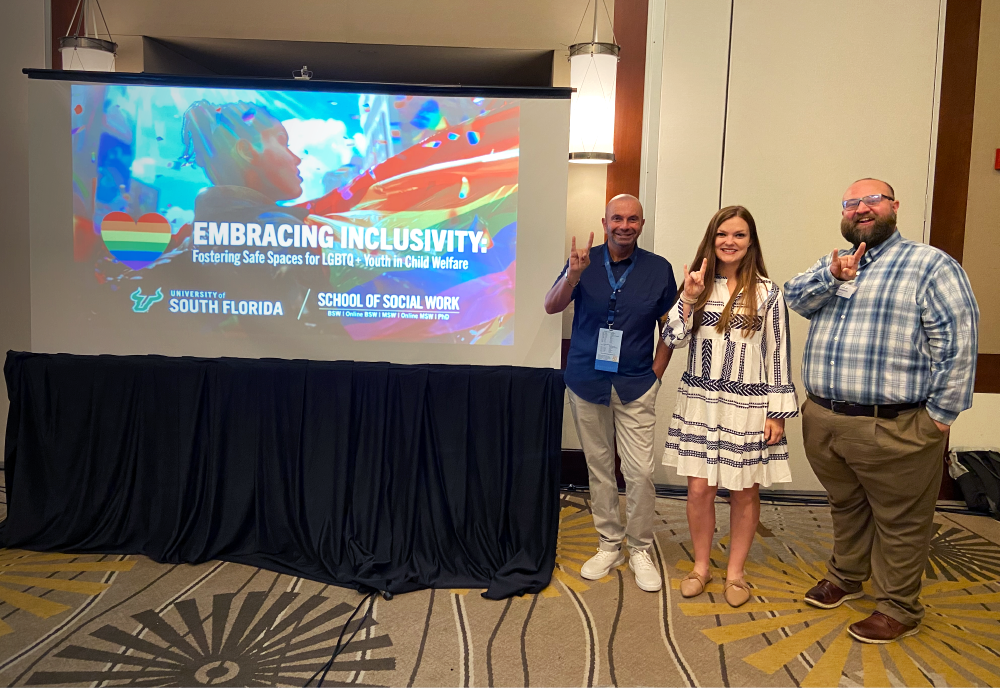While USF’s Online Master of Social Work is completely virtual, that doesn’t stop students from gaining hands-on learning experiences to enhance their education. Two Online MSW students recently presented research that they conducted about the importance of inclusive environments for LGBTQ+ youth in the child welfare system at the Safe Children Coalition Conference.
When Online MSW Program Chair and Assistant Professor of Instruction David Kilmnick offered the opportunity for his students to present at the conference, Shawn Fox and Valerie Teachout were eager to volunteer.
Fox and Teachout presented alongside Professor Kilmnick, who has a Doctor of Philosophy in Social Welfare, at the Hyatt Regency in Sarasota, FL, to provide insights that might help child welfare professionals foster welcoming environments for all individuals in their care. The trio highlighted research they conducted related to the challenges faced by LGBTQ+ youth, the current legal framework in Florida, the importance of creating affirming spaces, and strategies for building those environments.
Being involved in the foster care system is often a difficult journey but it comes with even more obstacles for LGBTQ+ youth, the group pointed out. In addition to the common issues associated with being moved from home to home, they said these youth must also worry about whether families will accept them for who they are.
Looking at the Numbers
Alarming numbers of LGBTQ+ youth in Florida have reported they have experienced discrimination based on their sexual orientation or gender identity, Teachout said. According to The Trevor Project’s 2022 National Survey on LGBTQ Youth Mental Health by State, around half have considered suicide, and 16% have attempted suicide in that year alone.
These kids often experience heightened mental health challenges when they are displaced or don’t have a stable living situation.
For children in the foster care system, school often serves as a safe space, but that’s not always the case with LGBTQ+ youth, according to Teachout. Only 43% identify their school as an affirming space, she said.
Additionally, their research shows that LGBTQ+ youth are overrepresented in the child welfare system, which is often due to family rejection, placement instability, and other related issues. To best support these children, they said, it’s essential to create LGBTQ+-friendly environments.
“Child welfare professionals are well trained in trauma, but there’s a lack of training and inclusion regarding the LGBTQ+ population,” said Teachout, who comes from a child welfare background. “Thus, I find it deeply rewarding to educate others through presentations that spark positive change and advocation of equality and respect for all. Everyone deserves basic human rights, and these presentations allow a platform to promote this.”
The presentation also gave the students a chance to enhance their career readiness.
“I come from a psychology background and have future ambitions of using my social work degree to do counseling,” Fox said. “Coming from that perspective, I think one of the most critical things to convey to my clients is that they have a safe and supportive environment. I see parallels in providing these supports in a counseling session and in the foster care system.”
Hands-On Opportunities to Make a Difference
With USF’s Online MSW program, students like Fox and Teachout aren’t limited to learning in the digital environment. They can bring their education to the next level by presenting at conferences, completing field hours, and participating in other hands-on projects, even if they rarely (or never) travel to campus for their classes.
“The Online MSW program at USF is meticulously designed to not only provide students with practical knowledge but also immerse them in real-world scenarios that prepare them for significant contributions to the social work field,” Professor Kilmnick said.
The opportunity to apply theory learned in the classroom to concrete issues is one of the many standout features of the online program.
“While the program is fully online, our approach transcends traditional boundaries and showcases our innovation and commitment to student learning opportunities,” said Professor Kilmnick. “We ensure students are not confined to digital interactions but are actively involved in their communities, gaining firsthand experiences and making tangible differences.”
To learn more about the Online Master of Social Work, visit the website or contact Tiffany Young at tyoung6@usf.edu.
